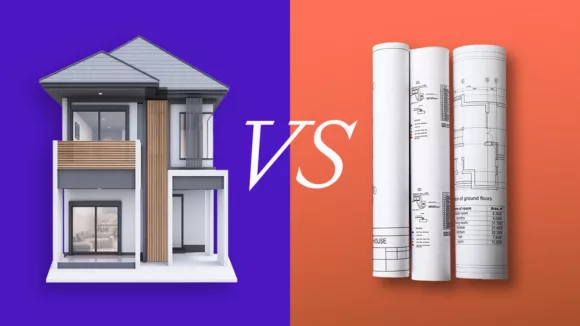
Property Investment
How to know if you can really afford an investment property top-up
Not sure if you can afford a $200-$350 weekly top-up on an investment property? Learn how to test your budget before you buy.
New Builds
8 min read

Author: Nefe Teare
Financial adviser at Opes. Formerly a senior adviser at one of NZ largest investment firms. Owned 3 properties by 30.
Reviewed by: Andrew Nicol
Managing Director, 20+ Years' Experience Investing In Property, Author & Host
Many property investors decide to buy a New build.
They require a lower deposit, so you don’t need as much money. They also often sidestep a lot of the Reserve Bank’s regulation, like the upcoming debt-to-income ratios.
But as you learn about property investment, you might ask, “should I buy a complete New Build? Or, should I buy one off-the-plans?”
Here at Opes Partners, we help investors buy New Build properties. So this is a question I get asked almost every day.
But, it can be hard to find an honest guide on the internet that clearly explains the pros and cons of both. That’s what you’ll get in this article.
The approach is simple. I will explain the pros and cons of each as honestly as I can. Then, I’ll take a step back so you can decide which is right for you.
Buying a property off-the-plans means you commit to buying a property that isn’t built yet.
Let’s start with the pros of buying a New Build this way.
When you buy a turnkey property off-the-plans, you commit to the price in the contract.
It doesn’t matter if construction takes 12 months or 4 years. The price will generally be the same. And during construction, you typically only pay a 10% deposit.
But, property values tend to go up over time. So, if you sign a contract to buy a property, its value may have gone up by the time it’s built
One investor I worked with signed a contract to buy a $495k house in Rolleston. By the time it was finished, it was worth $850k.
This was during the Covid property boom, so don’t expect that level of gain for your property. But it shows what is possible.
As mentioned, you usually put down a 10% construction deposit when you buy off-the-plans.
You don’t take out the rest of the mortgage until settlement. That could be 18-24 months later.
At the time of writing, interest rates are high. But, most economists agree interest rates are at or near their peak. In 12 months, they will probably have gone down a bit.
So, if you buy off-the-plans, you can potentially buy when interest rates are high and prices are low.
What happens when the property is built (and you get the mortgage)? Interest rates may have gone down, and property prices may have gone up.

So you can potentially avoid peak interest rates, while buying near the bottom of the market.
Developers often need pre-sales before a bank will lend money for a development.
So, developers often charge a bit less for properties bought in earlier stages of the project. They’re willing to offer a good deal to incentivise investors to buy off-the-plans.
Developers will also often hold on to the higher-priced properties in the development. They’ll sell them when the build is finished to make more money.
If you’re the first person to buy in a development, you get first dibs on whatever unit you want.
You might choose to get the corner house, because it’s got a slightly bigger garden. Or you might want to choose the property with a garage. The choice is yours.
But most properties will have sold if you wait until the development is complete. So you’re only able to choose what’s left over.
While New Builds bought off-the-plans have benefits, they also come with drawbacks.
The first con of buying off the plan is you don’t know exactly what is being built. You can’t walk through the house. You can’t see or touch it.
And you can’t get a building inspector to walk through it. What happens if the developer builds the property and does a bad job?
That is one risk of buying off-the-plans.
Developers often do a good job, and investors are impressed with how the property looks. But that doesn’t always happen. What if the finished property is awful?
One way to mitigate this is to use a trusted builder with a reputation for quality. You can also get a building inspector to look at the finished property to make sure the developer has built the property the right way.
But, there’s still a risk.
Properties bought off-the-plans porperty can go up in value during construction. But their value can also go down.
You might buy a house that is worth $600,000. Then by the time it is built it’s only worth $580,000. That can make it harder to get the bank to lend you money for the mortgage.
This is less of a risk when property values are rising. But as we saw in 2021, the property market can quickly turn.
One final con is that getting money from the bank can be harder. It could take 12 months to build your property.
But what happens if you have a baby and have one more mouth to feed? You might have to go down to one income while one partner stays home.
The bank might have been willing to say ‘yes’ before. But, with the little one in the picture, they may now say ‘no’.
There are ways to mitigate these risks. But, you don’t face the same pressures when you buy a completed New Build property.
Now lets change tact and look at completed New Builds.
These are properties that have already been built. They are ready for someone to move in to today.
If the property is complete, you can see it. You can touch it. You know what was built, so there are no questions about the quality. It's right there in front of you.
You can get a building inspection before you commit to purchasing it. You don’t have any nagging worries about whether the developer will build what they said they would.
With a completed New Build, you can commit to buying the property, get a mortgage, and pay for it within a month.
That can make getting money from the bank easier than buying off-the-plans.
If you think you might have a baby in 18 months, buying a completed New Build can make sense. That way you can get the finance approved and settled well before a major life change.
This is also the case, if you think you might change jobs, move cities, or move overseas.
Finally, there's no worrying about the property dropping in value during construction.
With off-the-plans, there can be a market downturn in the construction period. So, the property could be worth less on completion, than initially expected.
With a completed property, you already know what the value is. Sure, you won’t get the increase in value you might from an off-the-plans property. But, there’s less chance that the value goes down before you pay the money.
But, while the pros sound great, don’t forget the cons of Completed New Builds too.
As mentioned, interest rates are high. If you buy a Completed New Build, and draw down the mortgage, you have to pay today’s interest rates.
That can harm the cashflow of your property.
Off-the-plans properties may be able to avoid peak interest rates.
It’s great that with a Completed property, the price is the price.
It won’t go down in value during construction. But that also comes with a downside.
You lose the benefit that off-the-plans properties have. There isn’t the opportunity for the property to go up in value during construction.
Developers often don't sell all the units in a development off-the-plans. They usually hold back a few units to sell once they’re complete.
They discount properties bought off-the-plans to incentivise purchasers to buy. Then they put up the price of completed properties to make more margin.
That means you often pay a higher price for a Completed New Build.
Because most New Builds sell off-the-plans, there aren't many completed units left.
That means you get last pick of the properties. You need to buy one from the left overs that didn't sell, or the developer held back to sell for a higher price.
As you can see, the pros for one type of New Build is often the con for the other.
A Completed property is a great fit for people who need to buy and settle a property quickly.
So, if you’re about to go overseas or head off on maternity leave, a Completed New Build might be the right fit for you.
But, what if you're in a stable financial position, you've got a salaried job (and don't anticipate any change)? Buying off the plans could be the better fit for you.
Now you know the pros and cons of both, which do you think is the right fit for you? A completed property or one bought off-the-plans?
Let me know in the comments section below.
Financial adviser at Opes. Formerly a senior adviser at one of NZ largest investment firms. Owned 3 properties by 30.
Nefe is a Registered Financial Adviser at Opes Partners with 7 years’ experience in financial services. Before joining Opes, she was a senior adviser at one of New Zealand’s largest investment firms, managing $13 million in KiwiSaver and managed funds. She’s helped clients invest over $26 million in property and owned 3 properties before her 30th birthday.
This article is for your general information. It’s not financial advice. See here for details about our Financial Advice Provider Disclosure. So Opes isn’t telling you what to do with your own money.
We’ve made every effort to make sure the information is accurate. But we occasionally get the odd fact wrong. Make sure you do your own research or talk to a financial adviser before making any investment decisions.
You might like to use us or another financial adviser